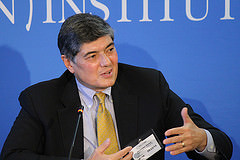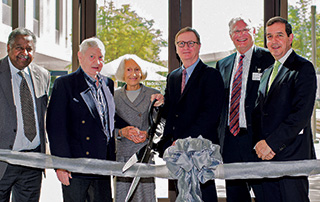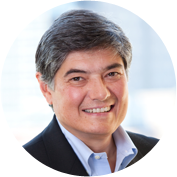Globetrotting and Goal Setting: Where Will Atlantic Wind Up?
Resource type: News
Christopher G. Oechsli, President and CEO, The Atlantic Philanthropies |
I have been on the road for most of the last four months, more so than in the prior three years I have been leading The Atlantic Philanthropies. In order to take in what Atlantic has done in its three decades-plus of grantmaking, I traveled between four continents to understand what our work means to our grantees, colleagues, partners and beneficiaries; identify what we can do best in our final phase; and begin to share what we’ve learned with people interested in Atlantic’s approach and experiences.

Christopher Oechsli at the Aspen Institute’s Foundation Presidents’ Series. (Photo: Aspen Institute) Watch video >
We are living out the philosophy of our founder, Chuck Feeney, who believes that philanthropy is most effective when donors are actively engaged in the deployment of their wealth and can develop and stimulate significant investments during their lifetimes. This Giving While Living approach can also work to solve urgent problems before they become more entrenched, expansive and expensive challenges.
Atlantic is the largest limited life foundation ever, and the approach is rapidly gaining popularity. Donors increasingly see the urgency of today’s problems and want to engage personally and immediately. I witnessed this firsthand at influential forums recently held at Stanford University, the Bosch Foundation in Berlin and the Aspen Institute in Washington, D.C.
I’ve written before about how I don’t describe Atlantic as a “spend down” foundation. I reject this term because it suggests that the deliberate depreciation of assets is our focus, rather than a tactic to accelerate philanthropic impact, build leadership capacity and foster sustainable change, up to the last grant and beyond.
We are ramping up our investments, not winding them down. This isn’t about emptying our coffers, but about fulfilling our goals and maximising what we hope to accomplish.
To tackle the issues we’ve long cared about, we have to address the systemic and endemic issues that undergird them. We have identified four thematic areas for all of our culminating grantmaking that build on Atlantic’s experience and values and prospects for catalytic impact. The bulk of Atlantic’s remaining assets are now earmarked for grants within these four themes:
- Inequality, Democracy & Social Change – eliminating obstacles to educational and economic opportunity, promoting racial equity, delivering on the promises of democracy and sharing how support for evidence-based advocacy can deliver social change and influence government policy and practice
- Health Sciences and Innovation – facilitating collaboration and cooperation principally among key Atlantic grantee institutions to maximise the prospects for partnership, discovery, innovation and sustainable solutions to some of the greatest health burdens of our time consistent with Atlantic’s historical programmes
- Health Equity – developing leaders, building capacity and training the personnel who work to improve health and provide equitable access to quality care
- Giving While Living – encouraging strategic, outcome-oriented philanthropy by high net worth individuals within their lifetimes by demonstrating effective approaches and identifying risks and pitfalls.
Many of these grants are already well into development, and we will share more about them in the coming months.
From Good Hope to a Just Future
My recent travels took me to Cape Town, South Africa, in early November to attend the Inyathelo Philanthropy Awards where Chuck Feeney was honoured along with 11 other incredible individuals for their personal contributions to bringing about sustainable change in South Africa. Back in New York, I joined legal scholars and activists from all over the world at a symposium at New York Law School celebrating 20 years of constitutionalism in South Africa. Martin O’Brien, Atlantic’s senior vice president of programmes, also spoke on a panel about using strategic public interest litigation to advance social justice with the authors of an illuminating new report on the subject.
Atlantic has invested in this vital work in South Africa for over 20 years. We completed our programmatic grantmaking in the region last year and have given considerable thought to how to build on and sustain the impact of our investments in the region through our culminating grants. We have made grants to several key institutions that advance social justice and constitutional, migrant and LGBTI rights; provided support to strengthen the field of philanthropy within South Africa; and, with a view to long-term sustainability, leveraged our investments through partnership with government and other donors and embedded match requirements to generate new sources of funding.
A signature of Atlantic’s decades of grantmaking is investment in buildings. Investing in physical capital is only initially about the buildings themselves, and more about investing in people and their communities. As part of our culminating work, we’ve explored how best to sustain the communities, organisations and fields we’ve supported through capital investments. In partnership with the Ford Foundation, we supported Lawyers for Human Rights to buy a building in Pretoria that will provide offices for the organisation and also serve as a civil society hub, by providing offices for other key NGOs and generate a sustainable income for the organisation. We are also supporting the development and renovations of a new permanent home for Inyathelo: The South African Institute for Advancement, the center of the NGO and philanthropy sector in the country.
From Collaboration to Innovation
Facilitating collaborations that will advance change well beyond our lifetime is a theme within much of our concluding work.
In September, Northern Ireland’s first and deputy first ministers announced a significant collaboration between the Northern Ireland Executive and Atlantic through a joint investment of £58 million ($92.7 million) to support shared education, dementia care and early years learning programmes in the region. These three themes were a focus of Atlantic’s programmatic grantmaking in Northern Ireland, and the joint partnership with government assures a sustained focus and investment in these issues beyond Atlantic’s lifetime.

Chuck and Helga Feeney (second and third from left) joined campus leaders for an Oct. 1 ribbon-cutting ceremony at Mission Hall, the new home of UCSF Global Health Sciences and clinical faculty offices. (Photo: Carmen Holt) Learn more >
The following month, I participated in a three-day convening of leading experts in population health from around the world at the University of California, San Francisco’s Mission Bay campus. This gathering afforded scientists and public health professionals from the United States, Viet Nam, Ireland and Australia – regions in which Atlantic has invested in population health and medical research – the chance to meet and learn from one another about the latest developments in brain health. Building these types of networks to facilitate collaboration and innovation well into the future will be an increasing priority for Atlantic in its final years.
It was meaningful to hold this convening at Mission Bay, one of the largest biomedical education and research campuses in the United States that was developed with substantial support from Atlantic and our Founding Chairman Chuck Feeney. Chuck has taken great satisfaction in seeing the Mission Bay campus rise from breaking ground to laying foundations for state-of-the-art laboratories generating groundbreaking innovations. He was particularly pleased to be able to join a portion of the meeting in October and observe in person the campus’s promise to organise multi-disciplinary, outcome-oriented collaboration in health.
Another region where Chuck’s vision for biomedical research and development is becoming a reality is Australia. In August, I visited the states of Queensland, New South Wales and Victoria to learn more about the achievements and collaborative possibilities of the knowledge economy that has developed as a result of Atlantic’s investments in and partnership with government for the construction and expansion of 25 higher learning and biomedical research institutions.
From Barriers to Opportunities
Here in the United States, we have been exploring efforts to dismantle systemic barriers to opportunity and develop new narratives that advance racial equity, recognising it is at the root of many of the issues we seek to address like school discipline, immigration, the death penalty and economic security. After a tumultuous few months, the Obama Administration’s recently announced commitments to immigration reform and to creating opportunity for young boys and girls of colour are encouraging steps, but continued pressure and advocacy by Atlantic grantees will be critical to turn rhetoric into reality.
The federal government, philanthropy and the private sector are now mobilising to address racial inequity and create opportunity for those to whom it has been denied. Let us use this moment of collective focus on immigration and the lessons of Ferguson to realise a more equitable and empathetic America, indivisible, with opportunity and justice for all, not just some.
From Start to Finish
Atlantic’s grants to date – to improve health, protect rights, advance reconciliation, strengthen higher education and promote opportunity for those who have been unfairly disadvantaged by life’s circumstances – represent approximately 90 per cent of our total endowment. As our foundation draws to a close, we are increasingly clear about how to best utilise and deploy the balance of our founder’s generous gift. We now have only two years of grantmaking remaining at The Atlantic Philanthropies, and our focus is on making the highest and best use of Chuck Feeney’s exceptional act of generosity 32 years ago. We intend that our final investments ignite change that lasts well beyond the writing of our last check.
American statesman Adlai Stevenson once said, “We can chart our future clearly and wisely only when we know the path which has led to the present. ” My recent travels have helped us map the impact of Atlantic’s history, and chart a course for the final phase that lies ahead. Though our grantmaking will end soon, we look forward to continuing the journey with you, our grantees, funding partners and emerging philanthropists.

Sincerely,

Christopher G. Oechsli
President and CEO